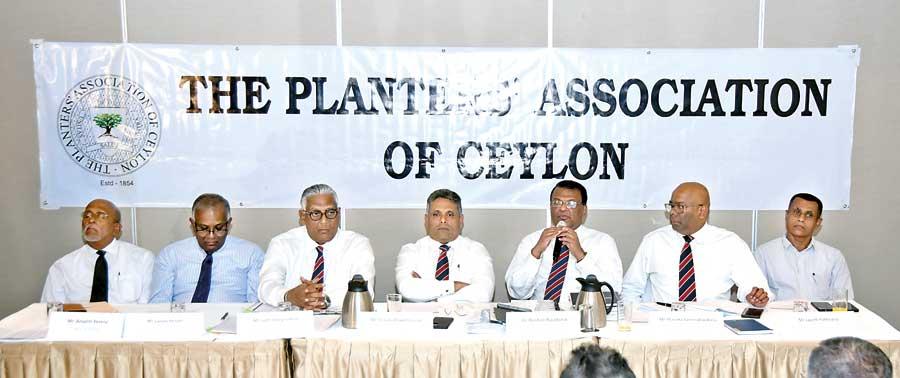28 May 2024 - {{hitsCtrl.values.hits}}

From left: Former CTTA Chairman Anselm Perera, CTTA Chairman Sanjay Herath, PA Secretary-General Lalith Obeyesekere, PA Chairman Senaka Alawattegama, PA Spokesperson Dr. Roshan Rajadurai, PA Media Committee Chair Shanaka Samaradiwakara, All Island Federation of Tea Smallholder Development Societies Chairman Jagath Pathirana
PIX BY KUSHAN PATHIRAJA
The tea industry veterans warned that the Ceylon Tea brand would face irreparable damage in international markets, leading to both decline in auction prices and global market share, if the government forced the plantation companies, including the smallholder sector, to implement the unprecedented 70 percent minimum wage hike arbitrarily.
Speaking at a press conference held in Colombo yesterday, industry veteran and former Colombo Tea Traders Association Chairman Anselm Perera termed the ‘arbitrary and reckless’ wage hike to be the fourth major crisis of the Ceylon Tea industry in post-independent Sri Lanka.
As a result of the decision, Planters Association of Ceylon (PA) Spokesperson Dr. Roshan Rajadurai noted that the cost of production for tea and rubber would rise dramatically, with estimates indicating a minimum 45 percent increase in the cost per kilogramme of tea.
“This wage hike will place an enormous burden on the Regional Plantation Companies (RPCs), which will face an annual increase in excess of Rs.35 billion, inclusive of the EPF/ETF and gratuity payments,” he said.
With this sharp increase of production costs resulting from the wage hike, Perera noted that the planters would be forced to trim the critical and essential expenditure items, which would drastically reduce the quality of Ceylon Tea and consequently causing an irreparable damage to the Ceylon Tea brand globally.
According to him, the exporters have already witnessed a reduction of orders from foreign suppliers, following the wage increase announcement, amidst the concerns on the sustainability of the industry.
“The suppliers are already worried. They know there’s no way we can cut our expenditures to finance this wage hike,” he said.
Ceylon Tea currently enjoys around a US $ 2 premium, due to the high quality associated with its brand name.
Perera recalled that the private sector rescued the dwindling Ceylon Tea brand after taking over the management of the state-owned tea plantations after the disastrous decision to nationalising the plantations. However, he pointed out that the ad hoc decisions to ban the popular weedicide glyphosate and ban on agrochemicals resulted in lasting damages, which the industry is still struggling to recover.
As a result of these policy decisions, Dr. Rajadurai noted that the Ceylon Tea output has come down by around 100,000 million kilogrammes over the past decade.
Perera feared this could result in the demise of the Ceylon Tea brand ultimately.
Meanwhile, All Island Federation of Tea Smallholders Development Societies President Jagath Pathirana noted that the smallholders are already finding it difficult to finance the cost of fertilisers and gradually moving into other crops. Hence, he pointed out that the wage increase could further fuel this trend.
According to Dr. Rajadurai, the RPCs had agreed to increase the minimum wage of the planation workers up to Rs.1380 and to increase over the kilogramme rate by 50 percent, with three rounds of negations held with President Ranil Wickremesinghe. However, the labour unions were adamant on the Rs.1700 living wage and doubling the over kilogramme rate.
The PA stressed that the financial strain is unsustainable and threatens the livelihoods of thousands of workers in the plantation sector.
“We might be able to afford the wage increase for one month but we might not be able to pay it afterwards,” Dr. Rajadurai said.
The PA has long advocated for a shift to a productivity-linked wage model or a revenue share model, which aligns worker compensation with productivity and revenue earned at auction.
“This approach not only incentivises productivity but also ensures a fair and sustainable wage system for workers. Already the workers under revenue share, under the previous wage structure, recorded earnings in excess of the minimum wage that was recently gazetted,” it said.
According to him, 30-40 percent of the RPC tea output comes from its revenue sharing model. As of 2018, some workers even earned up to Rs.90,000 monthly, under this model.
“The current daily attendance-based minimum wage model is outdated and does not reflect the realities of the modern plantation industry. Any disruption to production or quality standards could send shockwaves through export markets, diminishing export revenues and competitiveness,” he said.
The daily plucking average remains at 18 kilogrammes per day, compared to 45-60 kilogrammes in Kenya and 60 kilogrammes in some parts of India.
Over 2.5 million, accounting 10 percent of Sri Lanka’s population, livelihoods are tied to the tea industry.
19 Nov 2024 25 minute ago
18 Nov 2024 8 hours ago
18 Nov 2024 9 hours ago
18 Nov 2024 9 hours ago
18 Nov 2024 18 Nov 2024